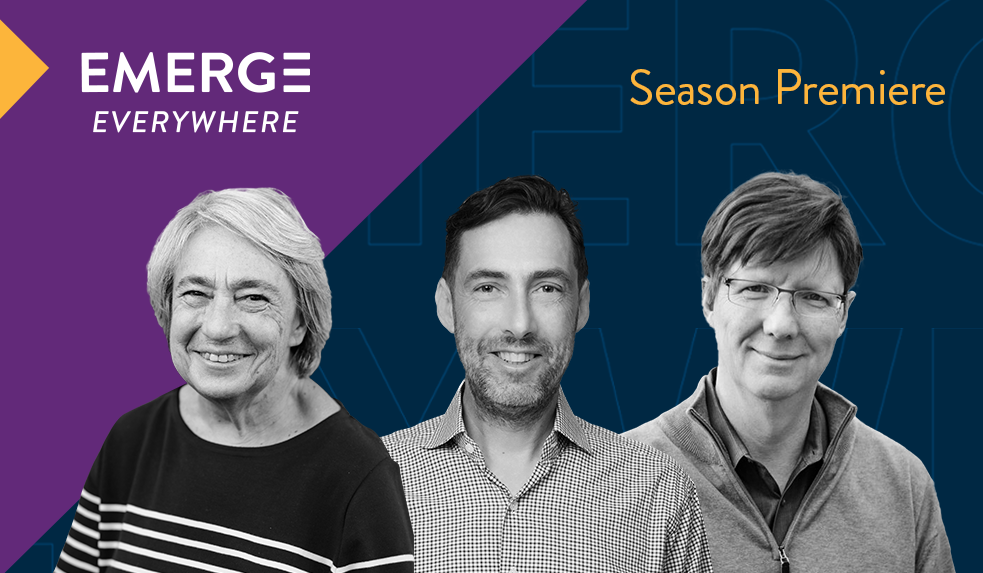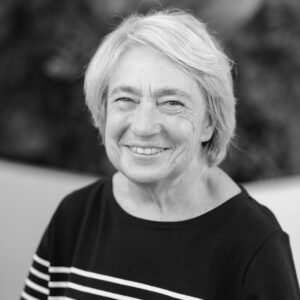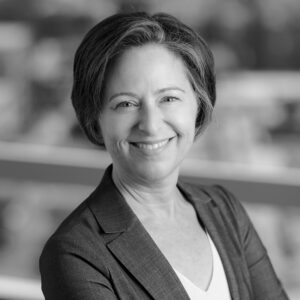Reflecting on 20 Years of FinHealth
It’s been two decades since the Financial Health Network and a national movement to improve financial lives were founded. As we celebrate 20 years of creating financial change, what does the future hold? Listen in as longtime finhealth champions Ellen Seidman of the Urban Institute, Arjan Schütte of Core Innovation Capital, and Tilman Ehrbeck of Flourish Ventures reflect on our journey and what we can do next to make the biggest difference in financial health.
-
Program:
-
Category:
Guests

Arjan Schütte
Arjan Schütte is the founder and a managing partner of Core Innovation Capital, a mission-driven venture capital fund investing in financial services companies that empower everyday Americans. Arjan is a sought-after consumer finance expert and a passionate advocate for market-based financial inclusion. He has been quoted in the Wall Street Journal, The New York Times, and The Economist, and has spoken everywhere, from MIT to the White House. Arjan served as a member of the CFPB’s Consumer Advisory Board and is a Senior Advisor to the Financial Health Network (formerly CFSI), the nation’s leading authority on financial health, which he helped start in 2004.
Ellen Seidman
Ellen Seidman is a nonresident fellow in the Housing Finance Policy Center at the Urban Institute. She is a member of the board of the Financial Health Network. From 2002 to 2010, Seidman held positions at ShoreBank Corporation, and from 1997 to 2001, she directed the Office of Thrift Supervision. Seidman was Special Assistant to the President for Economic Policy from 1993 to 1997 and held senior positions at Fannie Mae, the U.S. Department of Transportation, and the U.S. Department of the Treasury. Seidman received a Bachelor of Arts from Radcliffe College, a Master of Business Administration from the George Washington University, and a Juris Doctor from Georgetown University.
Tilman Ehrbeck
Tilman is the Co-Founder and Managing Partner of Flourish Ventures, an early-stage investment firm backing mission-driven entrepreneurs and industry influencers working toward a fair financial system. He serves on the board of a number of portfolio organizations and as chair of the Advisory Council to the U.N. Special Advocate for Inclusive Finance. Tilman started his professional journey as a journalist in Germany before earning a Doctor of Philosophy in Economics from the EU-affiliated European University Institute in Italy and joining the International Monetary Fund in Washington, D.C.
For more insights from innovative leaders advancing financial health for customers, employees, and communities, explore all our episodes of EMERGE Everywhere.
Episode Transcript
Jennifer Tescher:
Welcome to EMERGE Everywhere. I’m Jennifer Tescher, founder and CEO of the Financial Health Network. For two decades, I’ve worked with leaders across industries to answer one central question – how can we make people’s financial lives better? Now I’m sharing these conversations with you. Listen in to hear how these visionaries are rewiring our society to support financial health for all.
2024 marks the 20th anniversary of the Financial Health Network. I started this organization 20 years ago when Google was going public and Mark Zuckerberg was inventing what was then called The Facebook in his dorm room at Harvard. The iPhone didn’t even exist yet and it’s been a crazy, wild ride. It’s a really exciting moment for me, but not just for me and not just for the organization.
It’s a moment that belongs to all of us, to everyone in the financial health community. It’s a time for us to reflect, rethink, and rewire: to reflect on how far we’ve come, to rethink society’s systems, and to prepare to rewire them to support financial health for all. Our season premiere is all about reflecting. We’ve invited three longtime financial health champions who have been with us throughout our journey.
The first is Ellen Seidman, who is a nonresident fellow in the Housing Finance Policy Center at the Urban Institute, and she was our founding board chair of what was then called the Center for Financial Services Innovation. Next is Arjan Schütte, who was employee number three at the Center for Financial Services Innovation. Today he is a policy advisor to the organization, and he’s the Founder and Managing Partner of Core Innovation Capital. And then last, I’ll speak with Tilman Ehrbeck, who’s the Co-Founder and Managing Partner of Flourish Ventures and was a founding partner of our Financial Health Pulse® research. While upcoming episodes will be focused on future trends that will affect financial health, I hope you’ll enjoy this important look back at the beginning of the financial health journey.
Jennifer Tescher:
Ellen Seidman, welcome to Emerge Everywhere.
Ellen Seidman:
Thank you, Jennifer. It’s so good to be here.
Jennifer Tescher:
You’ve spent decades working on community development and economic justice in the Clinton administration, at Shore Bank, at the Urban Institute, and that’s barely a snippet. Tell our listeners what drew you to this work. How did you end up in this arena and how have things evolved in terms of your interests along the way?
Ellen Seidman:
It was a long and winding journey that started in New Rochelle in the early fifties. New York, New Rochelle, interestingly, was the first northern city whose schools were desegregated by court order. I was in maybe seventh grade when that happened. While the junior high school had always been integrated, the feeder elementary schools had not been. A number of my junior high school colleagues had just been through what was a fair amount of turmoil as their schools were integrated, and I think that started me on a road of thinking about social justice issues.
Jennifer Tescher:
So you helped me launch what was then CFSI, the Center for Financial Services Innovation, when we were both working at ShoreBank – you were actually my boss at ShoreBank. I’m realizing now that we should probably tell our listeners as not all of them might be aware or know about ShoreBank.
Ellen Seidman:
ShoreBank was a commercial bank that was started in the seventies with the mission of demonstrating that one could be a commercial banker, a successful commercial banker, that is: make money, meet the regulatory requirements, while providing strong financial services to, at that point, Black communities in Chicago. The focus was on Black entrepreneurs. The focus broadened out later, and in fact, ShoreBank’s major successful product was construction lending to small contractors, many of whom were actually Eastern Europeans. But the focus on being a successful commercial bank, and by that I mean creating products that made their customers a success in lower-income communities – that’s what ShoreBank was all about.
Jennifer Tescher:
So hopefully it’s clear where the gleam in our eye around CFSI came from. It was really taking those lessons from ShoreBank and applying them to institutions that didn’t necessarily see themselves as being mission-driven, but making the same case that there were opportunities to leverage the capital and the products of financial institutions for good in communities in ways that also were good for the bottom line. So what are your reflections on the journey that we’ve been on over these last 20 years?
Ellen Seidman:
Well, I think to some extent it started in 1996 with an obscure law that required the Treasury Department to stop sending checks. As a result, the Treasury Department discovered an enormous unbanked population. And then in the year 2000, we had a census that suddenly found an enormous Latino population, most of whom were also disconnected to the financial services system.
Then along came the development of prepaid cards, which created an option to connect people to financial services that wasn’t cash and that wasn’t a checking account, but then some other interesting things happened. Like, after Hurricane Katrina, the federal government tried to do disaster relief and discovered they couldn’t find the people that they were supposed to be giving disaster relief to, and if they could find those people, they couldn’t access their bank accounts. So something needed to be done there.
Then we had the realization of the time that being unbanked costs you. That having to pay in cash was an enormous time sink for poor people, that really, if it could be solved, people could be given back a huge amount of their life. And really, the focus had been for a long time on payments, on checking. But as other people were busily discovering, borrowing was a critically important piece. Savings was a critically important piece, and planning (too). And one of the things that the Financial Health Network pulled together very early in its existence was that financial health involves spending, saving, borrowing and planning, and that you have to think of them altogether.
Jennifer Tescher:
So you did an incredible job, Ellen, of setting the table right, reminding people sort of what was happening at the time. And, you know, we can track many of those developments all the way through. The Treasury is largely paying people electronically now, although they’re still paying tax returns in checks. People of color, the Latinx community, others, while there are still quite a ways to go to ensure that they are fully included in the mortgage market, the small business market, etc., are more included than they were 20 years ago. And on and on. So are we actually any better off?
Ellen Seidman:
I think people are better off in the technical sense of access and also in some of the surrounding protections to that access. So you have things like the CARD Act and the CFPB and protections that were not there in 2000. On the other hand, the economy has clearly made life very difficult for a large segment of the population, and whether it’s just that we’re more aware of it now or whether the population whose finances are fragile or who are Vulnerable in FHN terms really has increased – yeah, we know it’s increased from 2022 to 2023 – but has it increased really over time? Who knows? But we do know that we went through a very, very long period of stagnant real wages. And while an awful lot of what the financial services sector and FHN and all of its for-profit, nonprofit partners have been able to do is make the money that you have go further and in a more efficient way. If the incomes aren’t there, people are still going to be financially fragile.
Jennifer Tescher:
So you referred a little bit in your answer to my last question, to the way we measure financial health, and we know that it’s a holistic measure based on a whole number of different indicators of financial status. We also know through our research and through our work that there is no one silver bullet. Frankly, even if we increased everyone’s incomes, that probably wouldn’t solve all of the challenges, although maybe it would come close. So from where you sit, what do you think is the one thing society needs to do that would make the biggest difference in financial health, especially for the historically marginalized?
Ellen Seidman:
I really do go back to the income issue. There’s a little bit of the woe-be-gone issue here. If everyone were paid a living wage, that would go a huge way toward more universal financial health. The reason I say it’s a bit of a woe-be-gone effect is that some of that higher wage would definitely get priced into everything people are buying. And so then the requirement for the living wage would go up and it becomes, to some extent, circular. I live in Portland, Maine. The minimum wage here is now $18 an hour and going up, and it was nowhere near that a couple of years ago. Now, the fact is we have a housing shortage and it still is hard for people to make ends meet. But not all of the difference between the former minimum wage and $18 has been priced into rents.
Jennifer Tescher:
Thank you for everything you have done and you do for the Financial Health Network and for being my friend.
Ellen Seidman:
Well, thank you, Jennifer. It has been a pleasure to have known you and worked with you for 20 years now, and I hope we have another 20.
Jennifer Tescher:
Arjan Schütte, welcome to EMERGE Everywhere.
Arjan Schütte:
Thank you. I’m excited to be on.
Jennifer Tescher:
So you were what was then CFSI’s employee number three, and we have been longtime partners in crime ever since, so I’m really excited to get a chance to speak with you today. You have spent your whole career working at the intersection of technology, entrepreneurship, and investing in the social good. Tell everyone a little bit more about your journey.
Arjan Schütte:
Sure. Well, since college, I was taken by technology and I fell into a startup and I really haven’t left the startup scene since. I spent a decade as an operator in a couple of venture-backed companies building educational software and then got excited about what Muhammad Yunus was doing with Grameen Bank. Professor Yunus got a Nobel Peace Prize for work that many others have also done and been pioneers in, but basically using private market ideas to create microloans in the poorest places on Earth that are essentially very, very small business loans and perform exceptionally well in that the way that they’re designed. And the particular design really captured my imagination and I was thinking, “Gosh, there’s got to be a way to do it in the U.S.” That brought me to the South Side of Chicago by introduction from a mutual friend and I got connected to our now longtime mutual friends and colleagues at ShoreBank, and that brought me to your desk.
I’ve since learned that microfinance doesn’t really work at scale in the United States as it was conceived in the Third World, but there are many other things that one could do, which we’ve explored together for many moons now, using technology and the company of all kinds of different parties – public, private, for-profit, nonprofit – to help create financial health.
Jennifer Tescher:
Well, before we get into fintech and fintech innovation, let’s stick to technology writ large for a minute, because I’ve spent the last many months thinking about the last 20 years as we celebrate our 20th anniversary. I’d love to just hear you reflect a little bit on technology and, you know, is it really all that? Has it really helped save the world? And now your newfound enthusiasm for A.I.?
Arjan Schütte:
Yeah, well, clearly, I think the smartphone has been a transformative piece of technology and continues to be. And I would give it credit for being a pioneer in helping increase access to financial services, both here and abroad. The other one that I feel like is less frequently discussed and maybe a remnant of a previous tech generation is the online marketplace and its ability to really create efficiencies and connect people commercially and otherwise.
So what’s powerful about online marketplaces is that it really helps us match two parties who are otherwise unknown to one another and whom otherwise might never find one another. The Internet really makes that matching possible in ways that are impossible without it, so that’s another big transformation that I think has been very powerful and important in advancing financial health. And the third one maybe is open banking. As I reflect on some of the checks that we’ve written or the companies that we haven’t backed but have been transformative, I think those part and parcel to open banking have been, you know, I think the kind of the third leg of the stool of really creating more access and more emancipation using technology in people’s financial lives.
Jennifer Tescher:
Yeah, so AI isn’t exactly new, but it’s evolving and its capabilities are evolving, and what about AI has got you most excited as we think about people’s financial health and well-being? Where are the opportunities?
Arjan Schütte:
Well, I really like this metaphor of what we’re seeing in the automotive industry. Right at the end of the day, most people don’t love driving a car. Most people love their car for its efficiency and getting them from A to B. And most people comparably don’t love managing financial lives, and we are stubbornly stuck in, you know, like a fairly low level of automation despite all of our modern technology in using technology to manage our financial lives. That, to me, clearly is where it’s going.
You know, people like Scott Cook have for decades helped the subset of the population who want to balance their checkbook and who want to monitor and optimize their lives and have the patience and curiosity and discipline to do so with better and better tools for many, many years. I think the lion’s share of the population just, it’s too complicated. It’s nothing you ever want to do. You just want it to work for you. And so that’s what I’m all in on that happening and on making incremental improvements in how that actually gets done, which really requires trust.
Jennifer Tescher:
So as we wrap up our time together, I want to pose one big hairy question. There’s obviously no one silver bullet, but what’s the one thing you think we need to do to make the biggest difference in financial health? And when I say we, I mean society. It could be core. It could be the government. Pick your actor.
Arjan Schütte:
Yeah, well, I think the biggest driver in financial health is income. With more income, many things go away. Without income, we’re dithering around the edges. And so I think the single biggest driver to doing that is a smart industrial policy that is smart about creating jobs here and better income here with global trade and globalism.
Jennifer Tescher:
Arjan, the best part of saying farewell to you on this show is that I’m going to get to talk to you later today and that we get to work so closely together. So thank you for everything that you have done these last 20 years around financial health. You’re such a leader in this field, and thank you for being along for the ride.
Arjan Schütte:
Thank you, Jennifer. It’s been a treat of my career.
EMERGE Financial Health 2024
How will YOU improve financial health this year? Join hundreds of leaders to reflect, rethink, and rewire the future of financial health at EMERGE 2024. Our special 20-year celebration is happening June 5th to the 7th in Chicago. Learn more and get your ticket at finhealthnetwork.org/EMERGE.
Jennifer Tescher:
Tilman Ehrbeck, welcome to EMERGE Everywhere.
Tilman Ehrbeck:
Hi, Jen. How are you?
Jen Tescher:
I am good. It’s always nice to see you. You know, I love the fact in particular that when I discovered that you and I both have early careers as journalists in common. But, you know, I really don’t really know much about your story of what led you to a career focused on inclusion and social impact. How did you get from that reporter in Germany to today?
Tilman Ehrbeck:
Well.
Jennifer Tescher:
The short version.
Tilman Ehrbeck:
It is a long, convoluted story. No straight line here. Yes, I did start out as a reporter, but then I did study economics for all the way through to a Ph.D. masters of investment. I think there are two experiences probably in my professional life that set me on this path of the last 15 years or so. The first one, it was very early on in my professional life, I worked in Africa, and that was an eye-opening experience for me, sort of a middle-class kid from Germany because I realized that families, hardworking families, in particular, parents in the countries that I was working in, they essentially wanted the same as parents all over the world. They want some economic stability. They want some predictability in their lives, and they want a better life for their children, most importantly. But what was also true is that societies had largely failed them, and they just did not have the opportunities.
So that stuck with me and fast-forward 15 years, corporate career, I was with my family in India and we lived and worked there for a few years. And those years reminded me of these early observations in Africa and what had happened at the same time as in India, there was an enormous energy and ingenuity to actually do something about this. So there was a lot of entrepreneurship both in government and private sector, actually, enormous creativity. When we came back to the U.S. in 2010 it was, I said to myself, you know what, let me put everything I’ve learned about the policy, the macro policy environment that I learned at the IMF. Let me put those learnings about industry structures and how they can change, about the private sector, innovation, technology-led innovation, which is what I had focused on in the years preceding. Let me put all of this together to a higher purpose, if you will. And that really set me on to this path that has culminated for now with Flourish Ventures.
Jennifer Tescher:
I think one of the other reasons why I have so enjoyed our relationship is because you have helped me to learn and understand more about the global dimensions of this work. And in fact, you were more focused in the developing world before you then trained your sights on what was also going on in the United States. I wonder if you might sort of paint a little bit of a picture if you think about the last 20 years.
Tilman Ehrbeck:
Let me try to do that. I start on the global side, which is where indeed we have a long history for 20 years – globally, and with that I mean, emerging markets really. We have come a long, long way.
You must remember that when I really started, when this field started some 20 years ago, the majority of working-age adults were actually outside of the formal economy and outside of the formal financial system. So in the least developed countries might well be 80%, if not more, of the working population. Even in middle-income countries, it was like 50%. Living outside of the formal financial system is very rough.
Imagine for a second you don’t have access to a savings account, to insurance, to the ability to transmit money. If you are a smallholder farmer in Africa and everything is done in cash. If you have a good harvest, then you have a lot of cash that you try to stash under the mattress and you try to tide you over the non-harvest season. And if the harvest fails, you are actually really, really in trouble. They call it the hunger season. So being outside of a formal financial system is very, very stressful and is actually for all of us here, pretty unimaginable.
Against that picture, we have made enormous progress, largely because of the cell phone as a once-in-a-generation tech innovation and because it allowed to reach far more people with new and different services at a far lower cost. We track this globally, by the way. There is this global survey called the Findex, which tracks this and we have included some 1.2 billion people or so ever since we started measuring. But I realized when I learned about the U.S., I realized the issue was really not so much inclusion. In the U.S., most people actually do have a job in the formal economy and most people actually do interact somehow with the financial system. The problem is that they are not served very well and that they are not financially healthy. You, the Financial Health Network and you, were very instrumental in helping me understand that. I remember very distinctly early on reading the manuscripts for the U.S. Financial Services Diaries. It became very clear that the notion of precarious economic lives is a problem for the majority of Americans. It reaches all the way into the middle class.
Then, of course, we teamed up to create a measurement infrastructure for the U.S. inspired by that global infrastructure, a measurement infrastructure that I just mentioned. So we teamed up to do the U.S. Financial Health Pulse to create a headline indicator that people can rally around. So in terms of achievements for the U.S., I do think there’s a notion of having created awareness. This is not a fringe problem for very few. The problem is a problem for the majority of American households, and we should do something about that and there are things we can do about that. To have created that awareness is probably the biggest achievement today.
Jennifer Tescher:
When we came to you and said we have to be able to measure this idea of financial health, people don’t know what it is. You know, I really credit you with being able to see the power of what the Findex had done, the influence it had had in not only making people aware, governments, companies, etc., but also creating targets, if you will, and then seeing progress over time. So that was a really important insight that I think was really critical in the development of the Financial Health Pulse – both the development of our measurement scheme, if you will, but then an annual survey to essentially know how financial health of Americans is faring over time.
So as we bring our conversation to a close, I’m going to ask you one last really giant question. Let’s talk about the United States now, just to make it slightly easier. What’s the one most important thing we might do that might make the biggest difference in financial health? Is it technology? Is it more income? Is it a better safety net?
Tilman Ehrbeck:
I’m going to probably disappoint you here a little bit, because I indeed tend to think in systems and we at Flourish do.
Jen Tescher:
Yes.
Tilman Ehrbeck:
Certainly when it comes to the financial system, we do believe that it requires all of the above. It requires tech-led business model innovation. It requires a policy and regulatory environment which is both supportive but also protective of consumer interests – sort of harness the upside of tech and minimize the new risks. It does require public digital infrastructure investments. We do all of that. I mean, our bread and butter is for-profit investing behind business model innovations, but we do have this ability to provide grants in the interest of the public good and we apply the VC mindset to that. We know that there’s a different type of capital required, but we still are looking for people who are entrepreneurial. Policy entrepreneurs, research entrepreneurs, ecosystem entrepreneurs like yourself, and we want them to have an eye on what constitutes their market test and crowding in others, because if something only happens because it gets the project grant money and then when the project grant runs out, then it folds, then it obviously didn’t meet its relevance test. So no one silver bullet. I’ll tell you one thing that we are excited about, and then I make the bigger picture caveat maybe at the end.
One thing we are excited about – we are experimenting with participating in the public discourse, the narrative around money and people’s money, and it’s very different from our traditional work. Of course we don’t do that ourselves, but we have backed social media entrepreneurs. We have several partners. One is a social media influencer. Her name is Haley Sacks. She goes by Mrs. Dow Jones, has a big following across the various social media channels. She picked up just relatively recently – she picked up this meme that went around that you might have heard about. It was sort of the girl math meme. It was meant to be funny, right? If I use my husband’s credit card, then the purchase is free. Or if I buy something with a discount, it’s really more like an investment. It was meant to be funny, but it’s also a bit toxic because it sort of perpetuates this idea that women aren’t good with money and that they are bad at finance. So Haley, Mrs. Dow Jones, took issue with that in social media and said that I don’t like this. Her criticism was picked up very quickly by other influencers in the sphere and then very quickly by the mainstream media.
We are pretty convinced that through those channels, you reach far more people with messages around money and how to think about it and how to take control of your life than you would with traditional financial literacy classes or these type of things, so we are experimenting. This is not the one thing, but it’s an interesting experiment.
Jennifer Tescher:
Tilman, I’ve always said that of all of our partners and supporters over these last 20 years, we have felt no greater alignment than with you and Flourish. We’re deeply grateful for all of your support and partnership and friendship, so thank you for joining me today.
Tilman Ehrbeck:
Okay, thank you.
Jennifer Tescher:
Thanks for tuning in to EMERGE Everywhere, powered by the Financial Health Network. Visit our website to get the latest financial health insights and resources and join the growing movement at finhealthnetwork.org.



